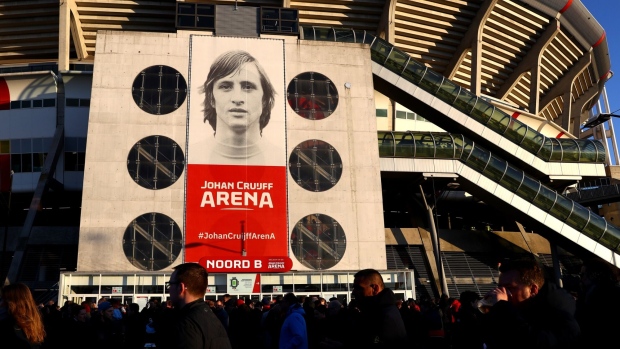Apr 19, 2024
Insider Trading Feud Ramps Up Drama at Football Giant Ajax
, Bloomberg News

(Bloomberg) -- AFC Ajax used to be heralded as a model club in the world of soccer. The team from Amsterdam helped pioneer swashbuckling “total football” of the 1970s, won three consecutive European Cups and nurtured dozens of top players over the decades. Now, Ajax is looking more like an example of how not to run a football club.
Allegations of sexual harassment, conflict of interest and then insider trading earlier this month are just some of Ajax’s off-field issues that have also been plaguing its on-field results. After having spent more than €100 million ($107 million) on players in pre-season, the club is on course for its worst league finish in more than two decades.
From FC Barcelona to Juventus and Manchester United, storied clubs enduring tough times is hardly new. But the decline of Ajax, a Champions League semi-finalist as recently as 2019 whose domination of Dutch football appeared unassailable, is remarkable for its speed and scope.
The downturn began two years ago when Marc Overmars, its director of football affairs, was fired after sending inappropriate messages to several female staff members. Overmars helped the club win four league titles, sign a number of top players and gain financial stability in the decade he was in charge.
Then his successor, Sven Mislintat, was fired in September as “disappointing” performances left the club at risk of being relegated to the second tier. His firing came on the heels of an investigation into an alleged conflict of interest arising from the transfer of defender Borna Sosa. The transaction was facilitated by a scouting agency that had a stake in a football data firm partially owned by Mislintat.
That scandal led to the resignation of Pier Eringa, chairman of club’s supervisory board, who was replaced by Michael van Praag, a former referee and chairman of the club, and whose father Jaap was chair during the club’s glory days.
This month, things got worse. Van Praag accused Chief Executive Officer Alex Kroes on “strong indications” of insider trading and announced plans to suspend him. The club alleged that Kroes, who was also the chairman of Ajax’s executive board, bought more than 17,000 shares of the club a week before his appointment was announced on Aug. 2.
Kroes acknowledged the timing of the purchase wasn’t ideal, though did not accept Ajax’s decision to suspend him. Shareholders will discuss the proposed dismissal at an extraordinary general meeting on May 21.
“I believe that you radiate confidence to your fellow shareholders and stakeholders when you buy shares and therefore also run financial risks yourself,” Kroes said in a LinkedIn post on April 2. “As much as I am convinced of my good intentions, I now understand, after consulting with my lawyer, that I did not make the most sensible decision,” he said. Kroes, Van Praag and Ajax didn’t respond to requests for comment.
Subsequently, it was revealed that Van Praag had failed to register his own acquisition of a small number of shares in the football club. He did that retroactively earlier this month.
That’s led to claims that Ajax is treating Kroes unfairly. Gerben Everts, chairman of Dutch shareholders’ association VEB, said the club was quick to ostracize Kroes over a mistake to avoid “collective responsibility.” The supervisory board is making it look like Kroes “is responsible as an individual — ‘we have done nothing wrong and you cannot blame us’,” Everts said.
Ajax’s fans agree. They put up signs during a match against FC Twente last weekend, asking for Kroes to stay and calling for the resignation of the supervisory board and Van Praag. “You need to look in the mirror,” Everts said.
On the pitch, matters when from bad to catastrophic. Days after the insider trading allegations emerged, the club was dealt a humiliating defeat in a key match against Rotterdam’s Feyenoord, a fixture referred to as the klassieker, with Ajax losing 6-0 on April 7.
The team is currently lying fifth in the Dutch Eredivisie. That would be the worst finish since 2000 season. It would also not qualify for European competitions.
“At big clubs, there are always some off-field issues, but Ajax’s problems are now getting to a point where it’s affecting the team directly,” according to Martijn Hilhorst, a Dutch football analyst. “It’s time for a fresh start. The supervisory board should be shaken up, reducing its current level of influence.”
In truth, the club hasn’t been able to recover from the departure of Overmars, whose departure left a power vacuum, Hilhorst said. Shares in parent company AFC Ajax NV have dropped over 25% since his departure, after having failed to recover from a pandemic-driven slump.
Overmars, who was in his position from 2012 until February 2022, quit after he was confronted with reports about his behavior. Once he realized he had crossed a line, he “suddenly felt an enormous pressure,” he said at the time. A former player at Ajax, Arsenal and Barcelona, Overmars is now working as a technical director for Royal Antwerp FC in Belgium. He’s been suspended by governing body FIFA until Nov. 16.
Ajax needs to find “a leader to navigate them through this challenging phase in their history,” said Hilhorst. If they fail to do that, “they will be prolonging their current struggles,” he said.
©2024 Bloomberg L.P.


